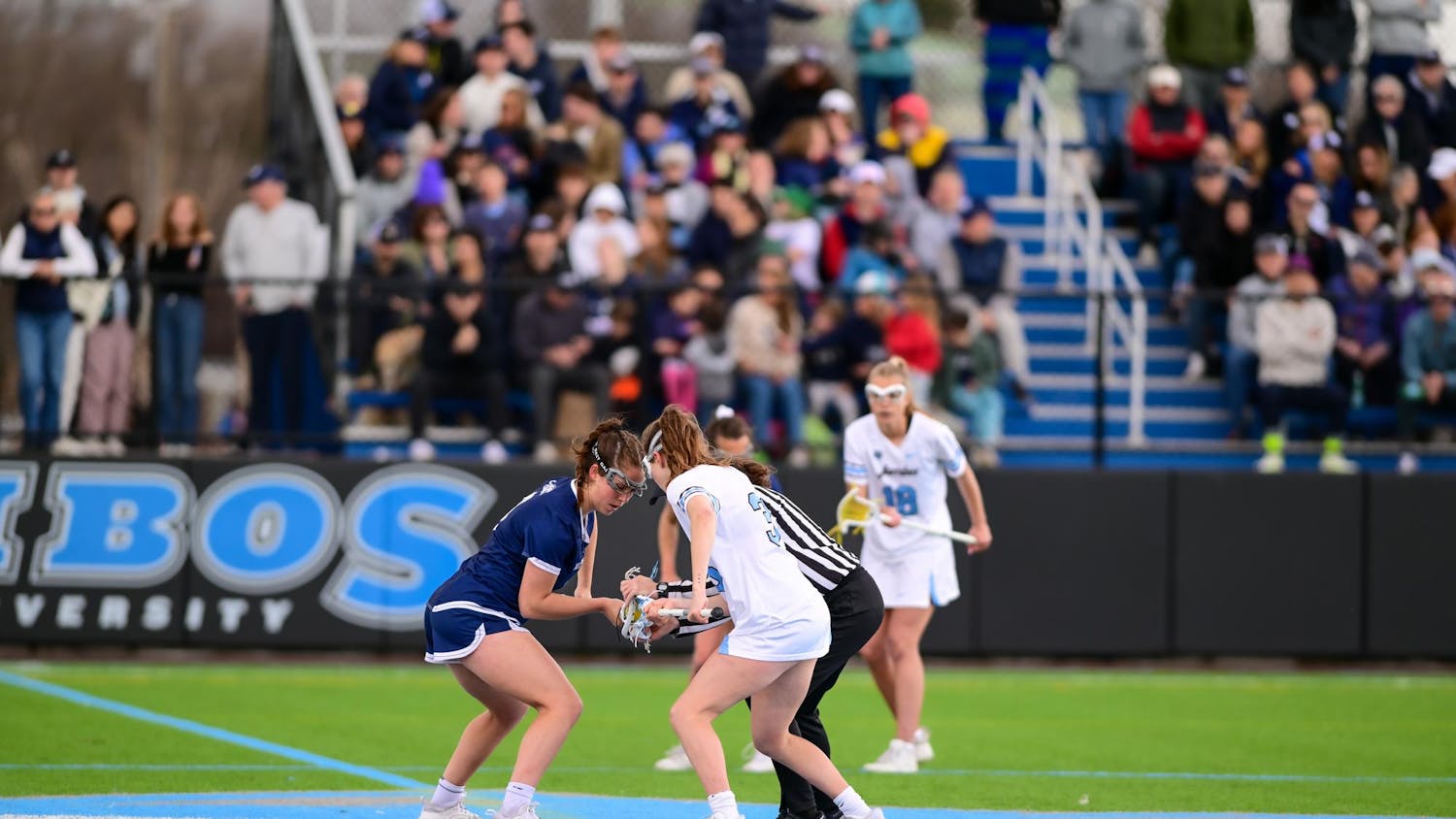Atticus Swett is sitting on a bench on a beautiful Easter Sunday, squinting at the blinding sun as he waits to begin the journey that, by now, has become so familiar. Wearing a jean-colored dress shirt split down the middle by a carefully knotted striped tie that occasionally sways in the cool April breeze, he ponders the future.
In a few moments, the freshman will travel the road that he's traveled so many times in his first year at Tufts, a trip that commences with a short shuttle ride from the Mayer Campus Center to Davis Square and concludes when he arrives at the simple red-and-white brick building a few blocks from Kendall Square.
In a few months, however, the freshman will embark on a mission of unfamiliar sorts, the destination of which is still unknown. He will depart from a burgeoning career as a linebacker for the football team and a thrower for the track and field team, not to mention the fast friends developed during his first year at Tufts, to answer a call.
On a campus at which nearly half the students study abroad, Atticus Swett will follow a similar path. Except he's probably the only one leaving it all behind to serve on a two-year Mormon mission.
‘To Kill a Mockingbird'
Atticus Swett. The same letter that concludes his first name and begins his surname together roll off the tongue, fusing into one sound that resembles an old Western sheriff's deputy more so than a Div. III linebacker.
Swett's mother Katrina, a political science lecturer at Tufts, named her sixth of seven children after Atticus Finch, the stoic hero from Harper Lee's "To Kill a Mockingbird." Finch was a teacher; he persuaded an Alabama town to objectively judge a man free of skin color. Just like Swett's namesake — a "daunting name to live up to," Swett says — the Tufts freshman is endowed with an innate ability to educate.
Sitting in the cushy blue pews in the off-white Chapel at The Church of Jesus Christ of Latter-Day Saints on Binney Street in Cambridge, Mass., Swett's voice swells with pride when speaking of his role within the ward and his upcoming mission. He's come here today, like he does every Sunday, to attend services with other college-age Mormons in the Boston area. It's a method of escape, a way of interacting with those familiar with a faith that forbids alcohol, premarital sex and coffee, the three basic tenants of any stereotypically collegiate experience.
"He's a person who stands by his principles, so that he's not swayed by some of the choices, some of the freedoms that are given to college kids," said defensive coordinator and linebackers coach Scott Rynne. "I think that's a pretty powerful thing. You can see why people are drawn to him or why people are drawn to his conversation when he can go out and do his missionary work."
Swett repeatedly refers to the mission as "answering a call to serve," really the only call he'll be answering anytime soon; Swett is allowed only two phone calls per year on his mission, traditionally made on Christmas and Mother's Day. He can access email once a week on a "personal day" but will resort to snail mail as the primary means of communication with non-family members. Other than that, it's a two-year, full-time job consisting of teaching and answering questions about his faith.
"It's an expectation for the young men, but it's not a requirement by any means," he said. "It's an encouraged choice. You don't have to go, but all the evidence from everyone in your life says it's been an amazing thing for them and it'll be a life-changing thing for you. You can't go wrong going."
The future will hardly mark a drastic departure from Swett's present. He frequently answers questions about Mormonism at Tufts even without the "Elder" label attached to his name, which signifies his missionary status.
When the teacher of his "History of Religion in America" class was absent during the unit on Mormonism, Swett, instead of the TA, fielded the majority of his peers' questions. After some teammates on the football team brought up the "South Park" episode, "All About the Mormons," at lunch, Swett watched the clip with them and pointed out some factual inaccuracies.
"That's pretty much all I do when people ask; it's just like in class and if you ask the teacher something, they'll tell you about it," he said. "People are curious to know about the Mormon Church because it's something that not many people outside it are familiar with. Generally, when people find out I ask some questions and I'm always happy to answer them as best I can."
It was always assumed that Swett would eventually go on a mission; his two older brothers, Sebastian and Keaton, served the Italy-Milan and Hungary-Budapest missions, respectively. Swett won't find out his destination until he receives the official call on Friday, at the earliest. But that hasn't stopped his family from guessing: Professor Swett thinks Denmark, where the family lived for three years during Atticus's childhood; Sebastian joked that Swett will end up in Africa, drop 50 pounds and return to the States a sliver of his 5-foot-11, 230-pound rugged self.
Swett, for his part, has no clue.
He's just looking forward to the ride.
"It really is a good test of that faith, that you have to be willing and have the right attitude no matter where you're called," he said. "It would be awesome to go somewhere to learn a new language and go somewhere exotic, but if I get called to New York City or backwoods Wyoming, I need to have the same attitude as if I was called to go to Portugal."
Out on a limb
Swett sometimes wishes he could sing in the ward choir, but with football practices and track meets, it would be too hard to make rehearsals. Instead, he's to the side of the stage, filling up small plastic cups — "little Mormon shot glasses," Swett cracks — with water, and placing slices of Wonder Bread onto plastic trays for the sacrament ceremony. Mormons don't drink alcohol, Swett notes, so tap water will have to do.
Swett chose Tufts over Williams College and Johns Hopkins University, partially for the community-oriented atmosphere and partially because of the large Mormon contingent in the Boston area. But given the small Latter Day Saints population at Tufts, feeling alone and out on a limb is inevitable.
"When you're one of two members here at Tufts, you just kind of feel isolated sometimes," he said. "For me, it's sort of been like that my whole life. In high school, my sister and I were the only members, and it's pretty much the same there as it is here. But everyone's really respectful even if they don't share the same convictions."
Swett has no complaints about his collegiate choice, especially as he emphasizes his peers' general tolerance and curiosity towards his unique — at least at Tufts — religious views. During football season, Swett fields questions every day from his teammates, generally about the church or his beliefs.
Given the recent media attention to Mormon athletics surrounding BYU's dismissal of star forward Brandon Davies after he violated the school's honor code forbidding premarital sex, Swett understands that a certain stigma is associated with his faith.
"People hear what they hear about different people and about Mormons, so they base a lot of their opinions on that," he said. "But if you get the chance to talk to someone and answer their questions, they take away some of those labels. Anytime you can dispel a misconception, or just fill someone's ideas about the church out, it's a good opportunity."
From Bow to brown and blue
Growing up in Bow, N.H. a small town with just under 8,000 residents just 15 minutes from the state capital, Concord, Swett always balanced athletics and religion. On Sundays in the fall, from fourth to seventh grade, he would attend the first hour of church and then get dropped off by his father at a Pop Warner football game.
Even at Tufts, Swett sometimes finds it difficult to balance the two sides, especially when activities conflict with games and meets. He wishes he could go to a few more church events, but that's just one of the sacrifices made to be a college-level athlete.
As Rynne sits in his office in Halligan Hall, he points out the front door to a board adorned with headshots from the football team, the pictorial symbol of the Jumbos' weekly awards. In the bottom right-hand corner, in the final slot for the final week in the column for "Scout Team Players of the Week," is Swett's smiling face.
"We want to reinforce the great behavior of our guys doing a job to help us get better offensively, making sure they're giving us the looks that we need," Rynne said. "That's not just something that's going to be handed out. And it's at the end of the year. It's a lot easier to do it in the first week than it is in the last."
In anticipation of returning to the gridiron, Swett foresees having a difficult time keeping in shape while on his mission. Save early-morning runs or pushups, Swett won't have the means to workout.
"Maybe I'll come back and become a wide receiver, maybe I'll go to Africa, lose some weight and get some running in … people can change," Swett said, that friendly smile bubbling up once again. "The likelier story is that I'll go, get a little chubby and have to work hard to just be average again."
New beginnings
After the sacrament meeting concludes, Swett slowly walks up to the front to clean up before Sunday school. Tossing the excess Wonder Bread off the plastic trays and depositing the empty "shot glasses" into a nearby trash can, he reflects on his identity as a Mormon athlete at a decidedly un-Mormon school.
"I guess I'm a multi-faceted human being," he said, the soothing sound of church music and idle, post-sacrament chatter in the background. "There are lots of different parts to me that are pretty diverse. I'm just a person who can fit in with lots of different groups of people. I don't like to put myself into any one category. I think I can get along pretty much anywhere. That's something I like about myself."
Here at the church, Atticus Swett is at home, no longer out on a limb. He's climbed back and down the tree, his feet firmly planted on the ground, ready to take the next step into a new horizon.
"You can just judge by his character," Brian Tew, the bishop of Swett's ward back in New Hampshire, said when asked how he could tell Swett will be successful on his mission. "When you go on a mission, you're being called to serve, and he pays his own way. There aren't too many young men who are 19 years old and willing to sacrifice two years to go to another place in the world to help and teach people."
The mission of Atticus Swett has already begun.





